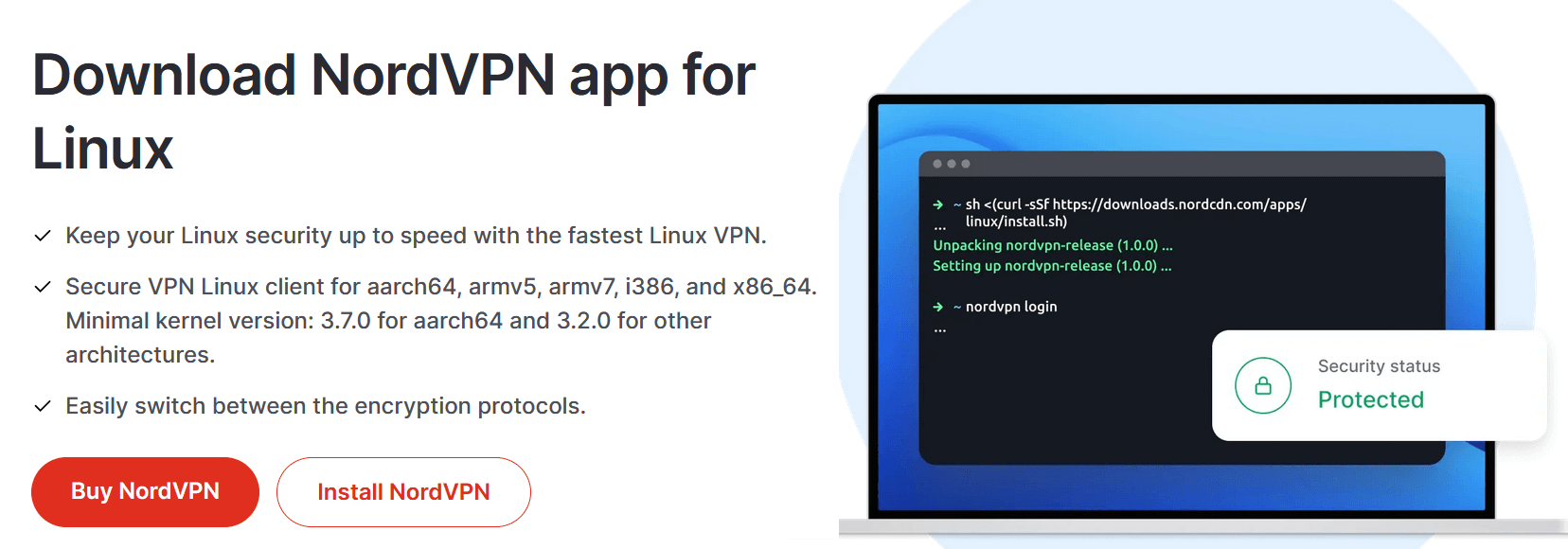A significant number of VPN companies tend to overlook the needs of Linux users by not prioritizing the development of dedicated VPN clients for Linux operating systems. To address this issue, we conducted a comprehensive assessment of 55 VPN services, evaluating their compatibility with Linux and how effectively they function on this platform.
In this comprehensive guide, we present a carefully curated list of free VPNs for Linux users. What sets these VPNs apart is that they offer a complete Graphical User Interface (GUI) solution, eliminating the requirement for users to navigate the Terminal command line or deal with intricate configuration files. By opting for VPNs with native Linux clients and user-friendly GUIs, Linux users can enjoy a hassle-free experience while maintaining their online privacy and security.
Our meticulous testing and review process enables us to provide valuable insights into the performance and compatibility of these VPNs on Linux, empowering users to make informed decisions.
[Highlighter]
Most Recommended (Free Trials) Streaming VPNs
The Best Free VPNs for Linux are as follows:
- NordVPN: The Best VPN for Linux @ [NordVPN_Price]
- CyberGhost: Strict No-Logs policy for Linux Users @ [CyberGhost_Price]
- Hide.me: Lightweight and powerful VPN @ [HidmeVPN_Price]
- ProtonVPN – Unlimited data and a dedicated GUI @ € 4.99 /month
- Windscribe – VPN that blocks malware, tracking, and ad. @ $5.75/month.[End_Highlighter]
How To Download, Use Free VPNs For Linux
Using a free VPN on your Linux system can enhance your online security and privacy. In this guide, we will walk you through the step-by-step process of downloading, installing, and using free VPNs for Linux. Please note that the specific steps may vary depending on the VPN provider you choose. Let’s get started!
- First, research and select a reputable free VPN provider that offers a Linux-compatible application.
- Go to the official website of the chosen VPN provider using your preferred web browser.
- Look for a page on the VPN provider’s website that offers the Linux VPN for download.
- Click on the download link provided for the Linux VPN application.
- Once the download is complete, navigate to the location where the file was saved.
- Then, Right-click on the downloaded file and select the option to install it.
- After the installation, you can usually find the VPN application in the applications menu or launcher of your Linux system.
- Open the VPN application by clicking on its icon.
- Then, you will enter your username and password and click on the login button.
- Once logged in, Select a VPN server location and click on the connect button to establish a secure VPN connection.
- After that, verify that your Linux system is now protected by the VPN. You can check your IP address or use online tools to confirm that your traffic is routed through the VPN server.
Are These Free VPNs Secure and Reliable for Linux?
Free VPNs can be a tempting option for Linux users looking to protect their online privacy without incurring any financial cost. However, it is important to consider the security and reliability aspects before relying on a free VPN service.
- Limited Security: Free VPNs often have limited security features compared to their paid counterparts. They may lack robust encryption protocols and may not offer essential features like kill switches or DNS leak protection. This can leave your sensitive data vulnerable to potential cyber threats.
- Data Logging and Privacy Concerns: Many free VPNs generate revenue by logging user data and selling it to third parties for advertising purposes. This compromises the very essence of using a VPN for privacy. It’s crucial to thoroughly review the privacy policy of any free VPN to understand how your data is handled.
- Bandwidth and Speed Limitations: Free VPNs generally impose restrictions on bandwidth usage and connection speeds. These limitations can significantly impact your browsing experience, making activities like streaming or downloading large files frustratingly slow.
- Limited Server Network: Free VPNs often have a limited number of servers available for users. This can result in overcrowded servers, leading to slower connections and reduced performance.
- Unreliable Performance: Since free VPNs cater to a large user base, they may experience frequent service interruptions and instability. This can disrupt your online activities and make the VPN connection unreliable.
What Advantages Provide By These VPNs?
In contrast, paid VPN services offer significant advantages:
- Enhanced Security Features: Paid VPNs typically provide advanced security features such as strong encryption, secure protocols, and additional security layers to protect your data and ensure your online privacy.
- No Data Logging: Paid VPNs have a vested interest in protecting their users’ privacy and often have strict no-logs policies, ensuring that your browsing activity remains private.
- Faster Speeds and Unlimited Bandwidth: Paid VPNs generally offer faster connection speeds and remove bandwidth limitations, allowing you to enjoy seamless browsing, streaming, and downloading experiences.
- Extensive Server Network: Paid VPNs often have a vast network of servers distributed worldwide. This enables you to access geographically restricted content and ensures better performance by reducing overcrowding on individual servers.
- Reliable Performance and Customer Support: Paid VPN services invest in maintaining reliable infrastructure, ensuring consistent performance and minimal downtime. Additionally, they typically offer dedicated customer support to assist users with any issues or concerns.
While free VPNs may seem appealing at first, their limitations in terms of security, privacy, performance, and support make them less reliable options for Linux users. Investing in a paid VPN service ensures a higher level of security, reliability, and overall user experience. It’s worth considering a paid VPN to maximize your online protection and enjoy a hassle-free browsing experience.
Comparison Between Free and Paid VPNs for Linux
Certainly! Here’s a revised version of the comparison table with the features listed in the columns:
| VPN | Unlimited Data | Server Network | Security Features | Privacy Focus | High-Speed Performance | Bypass Geo-Restrictions | User-Friendly Interface |
| NordVPN | Yes | Broad | Strong Encryption | Strict No-Logs | Yes | Yes | Yes |
| Proton VPN | Yes | N/A | Secure Core | Strict No-Logs | Yes | N/A | N/A |
| Windscribe | No | Limited | Malware/Ad Block | Limited | Yes | Limited | Yes |
| PrivadoVPN | No | N/A | N/A | N/A | Yes | Yes | N/A |
| Hide.me | No | N/A | N/A | N/A | Yes | N/A | Yes |
Note: N/A signifies that the feature is not applicable or the information is not readily available for that particular VPN.
On the basis of the above table, NordVPN stands out as the best VPN option for Linux users based on its unlimited data, dedicated GUI, broad server network, strong security, strict no-logs policy, high-speed performance, and user-friendly interface. It prioritizes privacy and employs robust encryption protocols, ensuring optimal security for user data. With its P2P-friendly servers and seamless navigation, NordVPN offers a powerful and reliable VPN solution that caters to the needs of Linux users, making it the top choice in the market.
How We Tested Reliable Free VPNs for Linux?
Our testing process for evaluating VPNs for Linux involves a meticulous examination of various specific criteria. These criteria are tailored to assess the performance and compatibility of VPN services on Linux platforms. Here’s an overview of the key factors we consider during our evaluation:
- Full-GUI Linux Application (35%): We prioritize VPN services that offer a comprehensive Graphical User Interface (GUI) application for Linux. This user-friendly interface eliminates the need for complex configurations or command-line usage, enhancing the overall user experience.
- Linux Distro Compatibility (20%): We test the compatibility of VPNs with a range of popular Linux distributions, including Ubuntu, Fedora, Debian, Manjaro, and others. A VPN that seamlessly integrates with multiple distros receives higher scores in this category.
- Encryption and VPN Protocol (15%): We assess the strength of encryption protocols implemented by VPN providers, giving preference to those that offer AES-128/256 encryption. Additionally, we consider the reliability and effectiveness of the VPN protocols used, with OpenVPN being a notable example.
- Advanced Features (15%): We evaluate the availability of advanced features such as a kill switch, port forwarding, and first-party DNS servers. These features contribute to enhanced security and customization options for Linux users.
- Privacy Policy and Logging Practices (10%): We review the privacy policies of VPN services to determine their logging practices. VPNs that retain minimal logs or have strict no-logs policies receive higher scores in this category, as they prioritize user privacy.
- Download Speeds on VPN Servers (5%): We measure the download speeds achieved when connected to various VPN servers. Faster speeds indicate better performance and user experience.
The Final Wordings:
Based on these criteria, we have tested and evaluated 55 VPN services across the six key categories mentioned above. Each category is rated on a scale of 10, and these ratings are combined to calculate an overall Linux rating for each VPN. Our comprehensive assessment enables us to provide reliable recommendations for the best VPN services for Linux users.



